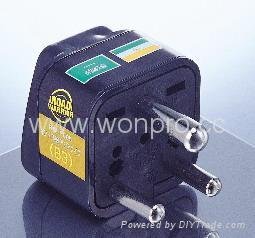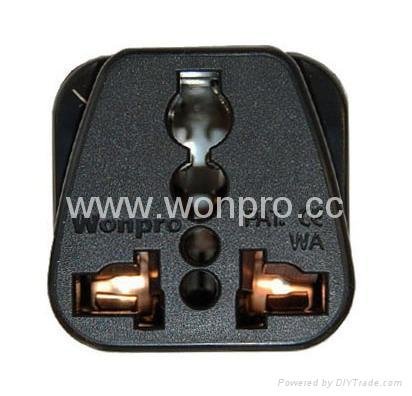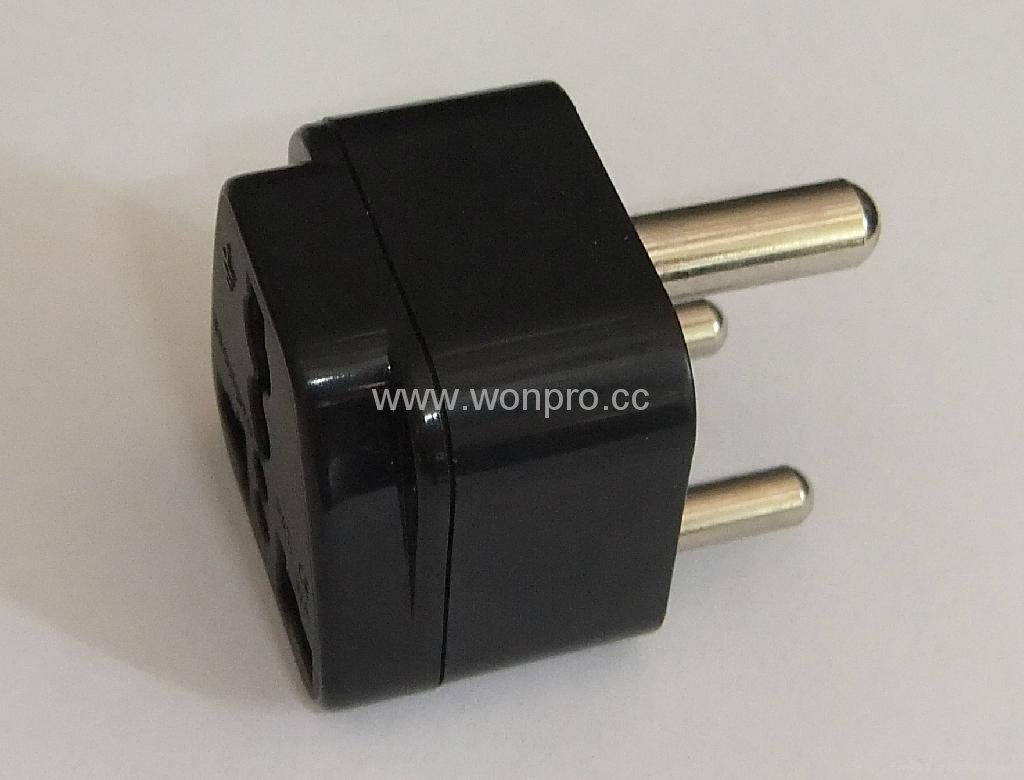Model No.︰WA-10-BK
Brand Name︰Wonpro
Country of Origin︰China
Unit Price︰-
Minimum Order︰1000 pc
Brief of Product:
India Plug Adapter (Grounded)
Type D small 5 amps BS 546
5/10A 250V
7.0mm, 5.0mm, 5.0mm Universal Input: accept Type A ~ Type L plugs; i.e., accept any country-specific plug except Type M plug (the huge 8.7mm South Africa plug) & Type N Single Output: Suitable for India, South Africa, Hong Kong, etc.
Technical Specifications:
TYPE D: (Old British plug) Round pins with ground
This plug adapter changes the shape of an appliance's plug so that can plug into a "Type D" Indian ("Small" 5 amp BS-546) socket. The receptacle end of the adapter can accept any standard household plug type from any country, except the "Type M" South African SABS1661 (Old British BS-546 "Large") plug. The plug end is a "Type D" Indian ("Small" 5 amp BS-546) plug. The adapter's live and neutral pins are 5mm in diameter and spaced 22mm apart, and the grounding pin is 7mm in diameter. The plug is polarized and grounded.
The Type D electrical plug has three large round pins in a triangular pattern. Type M plugs are often used alongside Type D plugs for larger appliances and as a result, some sockets work with both Type D and Type M plugs.
The Type D electrical plug is also known as the Old British Plug. It has three large round pins in a triangular configuration, and may be found in countries that were originally electrified by the British.
The technical name for the Type D plug and receptacle is the BS 546 (5 A/250 V earthed). This type was the standard in the UK until the 1940s. It was also previously used in South Africa, but has been phased out by the Type M. In other former British colonies, the plug has been mostly replaced by the Type G. Today, the Type D 5 A, and its 2 A cousin, are sometimes used in the UK for centrally switched lighting circuits, in order to distinguish them from normal power circuits.
Compatibility
This travel plug adapter is compatible with "Type D" Indian ("Small" 5 amp BS-546) sockets. This is an old British standard which is still the primary household socket type in India, Nepal, Namibia and Sri Lanka. It can also be encountered in some locations in several other countries as well, despite not being "the standard" in those countries. The "Type D" Indian plug and socket is not to be confused with the "Type M" South African plug and socket. In pictures, they look very similar, but the South African type is much larger than the Indian type, and they are physically incompatible.
Since the "Type M" large South African and the Indian "Type D" small versions of the old British BS-546 standard are so closely related, often confused, and often both used in the same areas, it is strongly advised that if you're going to a place that uses one of these two types, you should bring an adapter for both typesunless you're absolutely sure that your specific location will be wired with only one of the two.
How it's used:
Attach a plug adapter to the power cord of any electrical appliance which is already compatible with the voltage being supplied by the socket. The adapter changes the shape and configuration of the electrical contacts, allowing you to plug into a different kind of socket.
Or, if you prefer to think of it this way, plug the adapter into an electrical socket to enable the socket to accept almost any worldwide household plug (as long as the appliance is already compatible with the voltage being supplied by the socket.) Adapters aren't built for permanent installation though, and it's not a good idea to leave the adapter plugged into the socket indefinitely. They can remain plugged in for long periods of time, but they're not intended to be permanently installed.
Caution:
Where it's used:
Afghanistan, Bangladesh, Benin, Botswana, Cameroon, Chad, Dem. Rep. of Congo (Zaire), Dominica, Ecuador, El Salvador, Ethiopia, French Guiana, Ghana, Greece, Guadeloupe, Guyana, Hong Kong, India, Iraq, Jordan, Kenya, Lebanon, Libya, Macao, Madagascar, Maldives, Martinique, Monaco, Myanmar (Burma), Namibia, Nepal, Niger, Nigeria, Pakistan, Qatar, St. Kitts-Nevis, Senegal, Sierra Leone, Sri Lanka, Sudan, Tanzania, United Arab Emirates, Yemen, Zambia, Zimbabwe.




